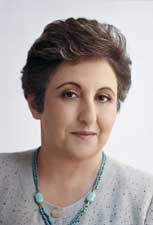An Honest Conflict Resolution!!
Goudarz Eghtedari
The International Atomic Energy Agency (IAEA) is expected to send a report on the Iranian nuclear program to the UN Security Council on March 6th. After almost 4 years of meetings and extensive monitoring, UK, France, and Germany (EU-3) have called off the negotiations due to an impasse on these talks.
Last week German former foreign minister Joschka Fischer and Zbigniew Brzezinski, National Security Advisor to President Carter, appeared together to discuss foreign policy problems at the Center for Strategic and International Studies and called on the US administration to get directly involved in the nuclear negotiations with Iran. However, when Adam Ereli, deputy spokesman for U.S. Department of State, was asked about the Fischer-Brzezinski’s comments, he responded that the US is happy with the outcome of the EU-3 negotiations and does not think there is a need for direct talks with Iran. Considering that negotiations between the EU and Iran were halted a month ago without a positive result, one would ask what exactly the US administration is calling successful. And what is in the outcome that our State Department is happy about?
The fact of the matter is that one can not enter an honest conflict resolution process hoping for stalemate negotiations. Parties who are directly benefiting or feeling harmed by the situation should be involved for the remedies to be meaningful. In this case however, the US’s objective must have not been to resolve the problem, but to take Iran to the UN-SC similar to the case of Iraq. Perhaps that is why Mr. Ereli calls it a success; otherwise this is clearly a failed process, as Mr. Fischer and the rest of the diplomatic community believe. Joschka Fischer was directly involved in the negotiations until Germany’s new chancellor came to office and has the most insights. Hassan Rowhani, the chief Iranian negotiator at the time has recently disclosed in a published report that “… cooperating with the Europeans would not change anything because Europe was not independent from the US which was committed on taking us to the Security Council.” (Raahbord, journal of Iranian Center for Strategic Studies, Fall Issue 2005)
Two points that have been conveniently ignored by the Western media were that right before the formal breakdown of the negotiations last January, Iran agreed to a ban for up to two years on industrial uranium enrichment process, while negotiations continue, and in return asked for a guarantee that the country will not be attacked militarily. Unfortunately the European negotiators could not offer such security guarantees while Americans were not at the table. President Bush, Vice President Cheney, and Secretary Rumsfeld on the other hand have continuously reminded the world that a military option is still on the table. As Mr. Brzezinski noted in his appearance in Portland last year, you can not stop a country from the pursuit of nuclear capability if you constantly threaten them with military attack and regime change.
One last minute announcement from the Russian and Iranian Nuclear Energy Agency chairmen this week brought some hope that there might still be a way to resolve the issues in hand. Reports from Tehran and Moscow indicate that Iran has accepted in principle the Russian proposal (endorsed by President Bush) to establish a joint venture that would enrich Iranian uranium to reactor level outside of the country to defuse the suspicions that Iran might divert some nuclear fuel into a weapons program.
Considering Russia's record with providing natural gas to Ukraine, the Iranian party understandably has asked for other partners, such as China, in the deal. Iran again has linked this agreement to guarantees of its territorial sovereignty. It is time for President Bush to refrain from his unilateral strategy in dealing with world affairs and become an involved partner in solving this problem.
As President Bush mentioned in his state of the union speech and is followed up with India and Pakistan, it is every country’s right to have peaceful nuclear energy--he is in fact proposing it as an alternative energy source in the US. So why not call on the Iranian proposal to get involved in their energy project, give them modern and safe nuclear reactors and monitor their activities on the ground under IAEA safeguards. After all we should remember that the master plan for Iran’s nuclear program was designed and endorsed by President Ford’s administration, and the Iranian regime is just following the steps that the US Department of Energy and Stanford University outlined back in 1976. The US should actively participate in the discussion and use its economic and strategic advantages to concurrently pursue other important issues such as Human Rights, the Middle East peace process, and the fight against drugs and terrorism. If we have learned anything from the Iraqi adventure, it is that we should stop the bloodshed before it starts.





